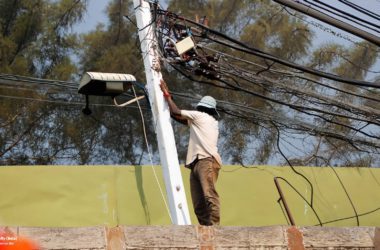Table of Contents Show
Power theft is a prevalent issue that significantly impacts the power sector in India. Theft or pilferage of power refers to the illegal consumption of electricity without proper authorization or payment. Sometimes culprits have a proper electricity connection – often times they don’t.
This blog post explores the consequences of power theft and provides personal anecdotes from the perspective of a power distribution engineer in Uttar Pradesh, shedding light on the challenges faced and the efforts made to combat this problem.
Understanding Power Theft in India
Power theft can take various forms, including meter tampering, unauthorized connections, and bypassing meters. These practices undermine the financial sustainability of power distribution companies and put a strain on the overall power infrastructure. The magnitude of power theft in India is staggering, with significant losses incurred annually.
Consequences of Power Theft
The consequences of power theft are far-reaching and affect multiple stakeholders. Power distribution companies bear the brunt of financial losses, as the revenue lost due to theft directly impacts their operational capabilities and investments in infrastructure development. This, in turn, leads to inadequate power supply and puts additional pressure on the existing infrastructure.
Furthermore, power theft contributes to increased tariffs for honest consumers, as power distribution companies attempt to recover the lost revenue. This places an economic burden on households and businesses, hindering economic growth and development.
Challenges Faced by Power Distribution Engineers
Power distribution engineers play a crucial role in identifying and addressing power theft cases. However, they face several challenges in their line of work. Detecting power theft requires expertise and advanced technologies to identify discrepancies in power consumption patterns. Additionally, legal and regulatory obstacles often hinder the effective prosecution of power theft offenders.
Power distribution engineers also face safety risks when dealing with power theft cases, as unauthorized connections and tampered equipment pose hazards. Technical challenges arise when attempting to maintain a stable power supply while investigating and rectifying power theft incidents.
Personal Anecdotes: Life as a Power Distribution Engineer in Uttar Pradesh
As a power distribution engineer in Uttar Pradesh, I have witnessed firsthand the impact of power theft on the power sector. Dealing with power theft cases is a regular part of our job, and it requires a dedicated effort to detect and mitigate instances of theft. The workload and stress levels can be overwhelming, as we strive to ensure a fair and reliable power distribution system.
Despite the challenges, power distribution engineers are committed to combating power theft. We work closely with law enforcement agencies, conduct awareness campaigns, and implement advanced technologies to detect and prevent power theft. These efforts aim to ensure a more equitable distribution of electricity and a sustainable power sector.
Initiatives to Tackle Power Theft
To tackle power theft effectively, various initiatives have been implemented. Technological solutions such as smart grids and advanced metering infrastructure enable better monitoring and detection of power theft incidents. Strengthening the legal framework and enforcement mechanisms is crucial for prosecuting offenders and creating a deterrent.
Public awareness and community participation play a vital role in curbing power theft. Educating consumers about the consequences of power theft and encouraging them to report suspicious activities can contribute to reducing such incidents. Community-driven initiatives empower local residents to take ownership of their power supply and discourage power theft within their communities.
Impact of Power Theft on Consumers
Power theft not only affects power distribution companies but also has a direct impact on consumers. The quality of power supply is compromised, leading to voltage fluctuations, frequent power outages, and damage to electrical appliances. Consumers face inconvenience and disruptions in their daily lives, impacting productivity and quality of life. Moreover, the socio-economic development of areas plagued by power theft is hindered, as businesses struggle to operate optimally and attract investments.
What are the penalties for power theft in India?
The penalties for power theft in India vary depending on the severity of the offense and the relevant laws in each state. Generally, power theft is considered a criminal offense punishable by fines, imprisonment, or both. The penalties can range from monetary fines to imprisonment for a period of months or even years, depending on the extent of the theft and its impact on the power sector. Power distribution companies, along with law enforcement agencies, work together to identify and prosecute offenders to discourage power theft and ensure compliance with the law.
How can consumers protect themselves from power theft?
Consumers can take several measures to protect themselves from power theft. First and foremost, they should ensure that their electricity connections are legal and authorized. Avoiding unauthorized connections or tampering with meters is essential. Consumers should regularly monitor their electricity bills and consumption patterns to detect any discrepancies that may indicate power theft.
If consumers suspect power theft in their vicinity, they should report it to the local power distribution company or the police. By reporting suspicious activities or unauthorized connections, consumers can contribute to the efforts against power theft. It is crucial for consumers to be vigilant, stay informed about their rights and responsibilities, and actively participate in maintaining the integrity of the power sector.
Are there any incentives for reporting power theft?
Yes, some power distribution companies in India offer incentives for reporting power theft. These incentives can include monetary rewards or discounts on electricity bills. The exact incentive programs may vary among different states and distribution companies. These initiatives aim to encourage consumers to play an active role in combating power theft by providing them with a tangible benefit for reporting such incidents. Consumers should inquire with their respective power distribution companies to learn more about any available incentive programs in their area.
How can smart grid technologies help in detecting power theft?
Smart grid technologies play a crucial role in detecting power theft efficiently. These technologies enable real-time monitoring and analysis of electricity consumption data, allowing power distribution companies to identify abnormal patterns that may indicate power theft. Smart meters, for example, can detect tampering attempts and transmit data instantly, enabling swift action to be taken.
Advanced analytics algorithms can analyze the data collected from smart grids to identify irregularities and anomalies associated with power theft. These technologies enhance the accuracy and effectiveness of detecting power theft, enabling prompt investigation and corrective measures. By leveraging smart grid technologies, power distribution companies can detect power theft more effectively and allocate resources to address the issue efficiently.
What role can communities play in combating power theft?
Communities play a crucial role in combating power theft. By fostering a sense of ownership and responsibility towards the power supply, communities can actively participate in identifying and reporting power theft incidents. Community members can be encouraged to report any suspicious activities, such as unauthorized connections or meter tampering, to the local power distribution company or the authorities.
Community awareness campaigns can educate residents about the consequences of power theft and its impact on the overall power sector. These campaigns can highlight the importance of paying electricity bills promptly, avoiding unauthorized connections, and reporting power theft. Additionally, community-led initiatives can promote responsible energy consumption practices and encourage residents to report any irregularities they observe in their neighborhoods.
By working together as a collective, communities can create a culture of compliance, discourage power theft, and contribute to a more reliable and sustainable power sector in India.
Conclusion
Power theft poses significant challenges to the power sector in India. It results in financial losses, inadequate power supply, and increased tariffs for honest consumers. Power distribution engineers play a critical role in combating power theft. However, they face numerous obstacles. Initiatives that leverage technology, strengthen the legal framework, and promote public awareness are essential for addressing this issue effectively. By working together, India can overcome power theft and build a more resilient and sustainable power sector.






